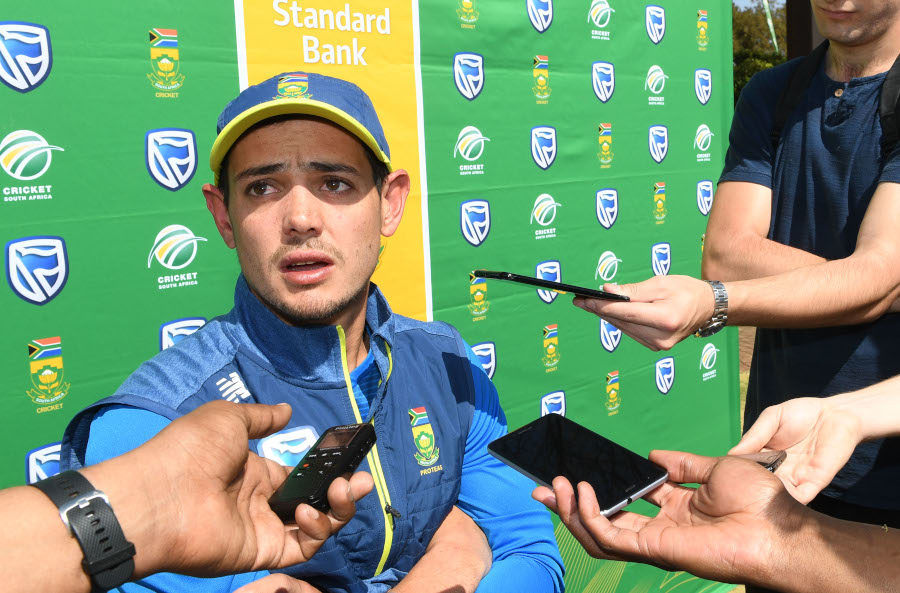The captaincy is seriously compromising the potency of a generational talent in Quinton de Kock. It’s time to free him of the responsibility, writes SA Cricket magazine editor RYAN VREDE.
I was surprised when De Kock was announced as the white-ball captain earlier this year. He didn’t strike me as a player who would thrive in a formal leadership role.
Certainly, he has a presence in the dressing room, and he has led by virtue of his performances. To hand him the responsibility of captaining a side in transition was concerning.
Over the course of my sports writing career I’ve seldom seen players of De Kock’s ilk want the role, or thrive in it. I liken the situation to that of Springbok and Bulls icon Fourie du Preez. Like De Kock, he too was among the most gifted players in any team he played in, but he detested being asked to operate in a formal leadership role.
Like De Kock, Du Preez’s media conferences were a painful experience for the media and player alike. Neither were/are able to fully articulate their thoughts in that environment. That probably has to do with a combination of them not really wanting to be there, or, at the very least, not having an appetite for that dimension of their responsibility. They experience media conferences as suffocating – which compromises the delivery of their thoughts. It felt particularly cruel to subject Du Preez to these conferences. It does so for De Kock as well.
Du Preez enjoyed the weight of expectation that came with being one of the best players on the team. This was often the catalyst for his best performances in the most high-pressure matches. But he was not one for soaring pre-match speeches, nor was he particularly vocal, in an exhortative sense, during matches. Ditto, De Kock.
However, despite being puzzled by the decision to make De Kock the white-ball skipper, I was prepared to give him the room to reveal himself as being competent in a formal leadership role. Sadly but not unpredictably, on the evidence of last summer and the beginning of this one, I think the captaincy has an adverse effect on him. More importantly, it’s having an adverse affect on the team by virtue of the fact that one of its best players appears to be compromised by this leadership responsibility.
De Kock’s body language on Tuesday while his bowlers were being caned to all parts of Newlands spoke volumes. He, though, said painfully little. The psychology of athletes who are among the pre-eminent in their codes means that De Kock couldn’t comprehend how those who are less extravagantly gifted (his entire bowling attack), couldn’t master their challenge. He is his own point of reference in situations like that, and while his immense gift doesn’t preclude him from periods of struggle, De Kock can’t relate to being dominated by an opponent. It is a quality shared by every marquee athlete in every code.
Former England batsman Ed Smith, describes this best in his book ‘What sport tells us about life’.
‘Scratch a brilliant sportsman deeply enough and you reach a layer of self-certainty in his own destiny,’ Smith writes. ‘The greater the sportsman, usually the more convinced he is of his own predestined greatness. The big stage means it is his stage, victory has been prearranged on his terms. It might be perfectly rational for a great player to believe he has a good chance of decisively influencing the big occasion. But that isn’t what he thinks. He thinks it is inevitable. After all, well-balanced self-awareness and genius seem so rarely to co-exist.’
It goes without saying that when this mental disposition meets a scenario where less gifted cricketers are being dominated, it is deeply frustrating for De Kock. That expressed itself in his body language, and has done so often during his captaincy tenure.
It’s time to free him from the shackles of formal leadership. He is too good, too valuable a player to compromise in this manner. I don’t fault coach Mark Boucher or director of cricket Graeme Smith for entrusting him with the responsibility. I don’t fault De Kock for trying. It just hasn’t worked and won’t work. That’s fine.
I also don’t know who should succeed De Kock. There are no obvious candidates. That, though, is of lesser concern than us compromising the potency of a generational talent.
It’s time to let Quinny loose.







